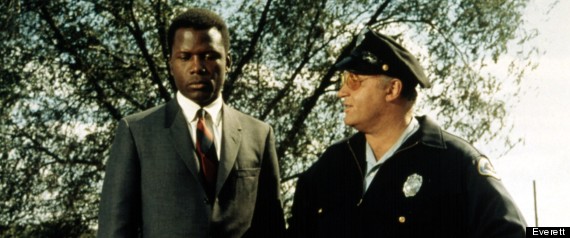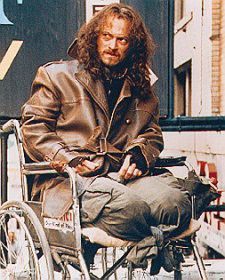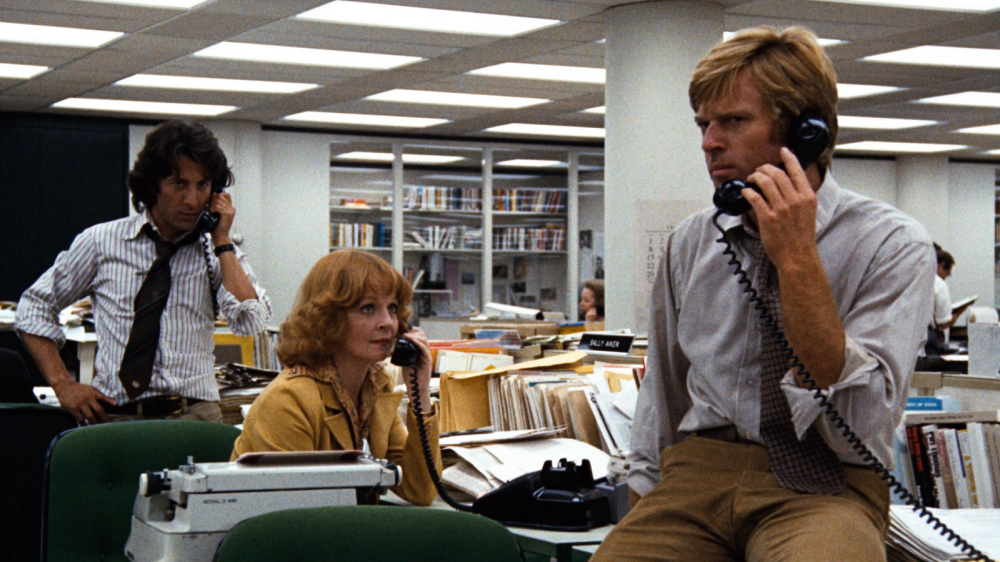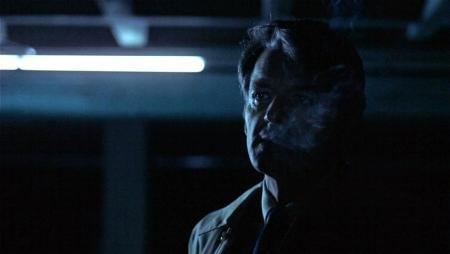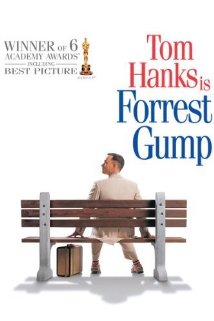100 Movies … 100 Posts: #75. “In the Heat of the Night” (1967)
 This is post #26 in my series, 100 Movies … 100 Posts. In this ongoing series, I’m watching and writing about each film on the American Film Institute’s list of 100 greatest movies from #100 to #1. I’m not just writing a review of each movie. I am going to write a piece about whatever I find most pressing, as a critique of the film, an address of the issues it brings up, or my own experiences with the film. It will serve as an examination of the list itself and of political issues in Hollywood and the film industry.
This is post #26 in my series, 100 Movies … 100 Posts. In this ongoing series, I’m watching and writing about each film on the American Film Institute’s list of 100 greatest movies from #100 to #1. I’m not just writing a review of each movie. I am going to write a piece about whatever I find most pressing, as a critique of the film, an address of the issues it brings up, or my own experiences with the film. It will serve as an examination of the list itself and of political issues in Hollywood and the film industry.
Without further ado, #75 “In the Heat of the Night”
——————————————-
Earlier, I wrote that it was disappointing that the AFI included “In the Heat of the Night,” on its 10th anniversary list rather than “Guess Who’s Coming to Dinner?” If there was only going to be one Sidney Poitier film on the list, then “In the Heat of the Night,” which was described as a buddy cop film about a black officer and a white officer who learned to put aside their differences to solve a crime, sounded like it dealt with less poignant subject matter than a movie about an interracial dating relationship. “Guess Who’s Coming to Dinner?” still sounds more interesting, as the world is flooded with police dramas, but “Night” is an excellent entry for the list. Then again, why isn’t there room for both?
“Night” does hold an important place in history, capturing the strong racial tension in the Deep South during the height of the Civil Rights Movement in 1967. Martin Luther King Jr. would be assassinated the next year on the day the Academy Awards ceremony was scheduled, so it would actually take place two days later. Despite taking place in Mississippi, no filming was done in the South because Poitier feared for his life after several incidents in which he was targeted because of his race, according to an article on Slate.
The film delves into racial issues like few others did for its time. That’s not just social taboos, like the issue of blackface or awkward interactions between people from vastly disparate cultures (like in “Guess Who’s Coming to Dinner?”). This movie dove headfirst into racial profiling and death threats from Confederate flag wavers.
In fact, the film doesn’t waste any time in getting to those issues, as Poitier’s Virgil Tibbs is introduced after the local police of the small town of Sparta, Mississippi, (a real town, though obviously fictionalized here) arrest him shortly after they discover a murder had been committed in town. The cop who finds him sitting at the train station waiting for a train pats him down and sees that he has about $100 in his wallet, which he must assume no black man could ever have earned. So, of course, Virgil immediately becomes a suspect and is arrested. Chief Gillespie (Rod Steiger) assumes he’s guilty once he’s been delivered to the station and begins interrogating him. It’s only when Gillespie asks “Where the hell’d you earn that kind of money?” that Virgil gets the chance to explain that “I’m a police officer.”
Virgil tells Gillespie that he makes $162.39 a week, which must have been a lot back then, but sounds like nothing today. Virgil’s not just a cop, he’s a homicide expert, and he was at the train station to catch a ride back to the North. Back where he’s from “They call me Mr. Tibbs.” So Gillespie gives Virgil’s chief a call and explains the situation, and Virgil’s chief decides he wants Virgil to stay in Sparta and help the department solve their murder.
The Sparta Police Department seems to be about as well equipped to handle a case of this magnitude as the Mayberry Police Department, but no one in Sparta has quite the machismo of Barney Fife. There’s no forensics expert there near the caliber of Virgil. Having just been detained by the police for no reason, and already sick of the town’s racism, Virgil can’t be faulted for just wanting to go home, but the chief insists he stay and help. Gillespie knows full well that he is in over his head without Virgil, which he takes as an attack on his pride, as he is already butthurt over the fact that Virgil both makes more money than he does, and is also black and has already made him look bad for issuing a false arrest. He takes a lot of shit from the town over the department’s ineptitude, so the ingredients are not there for a good working relationship between these two. But seeing Virgil work, Gillespie can’t help but begrudgingly show the least bit of respect for Virgil, even through back-handed remarks.
And make no mistake, Virgil demands respect. He doesn’t want to be here in the first place and threatens to leave every time Gillespie gives him shit or questions his authority. Virgil has nothing to gain from this, and he knows that Gillespie needs him, so he uses that to his advantage whenever he’s challenged. As Gillespie makes one false arrest after another (including an unrecognizably young Scott Wilson of “The Walking Dead” fame), he becomes more and more frustrated with Virgil’s determination to legitimately work the case. Virgil makes the white cops look like fools again and again.
But Virgil runs into instances where he nearly lets his own prejudices of white people and the South get in the way of good detective work. In one instance, Virgil’s investigation takes him to a cotton farm, where the audience is shown black people in the fields picking cotton, much like on a plantation, as if nothing had changed over 100 years. After he confronts the owner about the murder, and a brief physical altercation takes place, Virgil understandably wants to “pull that fat cat down,” and the world might be a better place for it. But some chiding from Gillespie makes him come to his senses, that this isn’t what he’s here to do, and he can’t let his disdain for the cotton farm’s owner cloud his work.
As the case progresses, Virgil gets into some trouble from the locals because, you know, he’s a black man in the South, and an accomplished one at that. Gillespie offers back up for him, and tells him he should leave for his own safety, but now that he’s committed to the case, Virgil’s pride won’t let him return home until his work is done. But by coming to Virgil’s aid, Gillespie is able to prove to Virgil that he can be of use. Look at that, a white cop has to earn the respect of a black cop, who woulda thought?
From the moment Virgil appears, racial tension drips from every frame of this film, and it’s spectacular. No punches are pulled. The complex dynamic between Virgil and Gillespie is riveting to watch, and the pair of Poitier and Steiger pull off a masterpiece. The supporting cast is great too. It’s good to see that the townsfolk of Sparta are presented realistically, rather than how racist Southerners are often stereotypically presented as stupid rednecks or hillbillies as they are in “Easy Rider.” The depiction of racism isn’t always overt in this film, but the power struggle between Virgil and Gillespie is often boiling beneath the surface rather than in strong outbursts. That’s important, as that’s how subtle racism often plays out in real life.
Yes, the two of them eventually get to a place where they can almost come to respect one another, which seems kind of silly, considering Virgil has every reason to distrust Gillespie from the moment the chief accused him of committing murder. But it’s not like they go out to karaoke together or anything like in “Rush Hour.” The two men do come to a point where they can understand the similarities between them and at least learn to respect one another on a professional level, but it’s obvious the tension between them would take a long time to heal. And once Virgil’s finished the case, there’s no reason for him to stick around that long.
The tension is so overpowering that the crime itself comes off as weak in comparison. It really only serves as a reason for Virgil to interact with the people around town through the investigation and demonstrate those social issues that exist between people of different races in society. The case even ends somewhat abruptly in an unsatisfying and anticlimactic manner, but it’s an adequate catalyst to push along the relationship between Virgil and the townsfolk.
For all the positives the movie accomplishes in telling the story of a black man trying to navigate a racially hostile environment, it seems wrong that Steiger won Best Actor that year, and Poitier wasn’t nominated. Poitier was the first black man to win Best Actor, but it was for “The Defiant Ones” in 1958.
In the wake of Michael Brown being gunned down by police in a different state that begins with “Miss-“, “In the Heat of the Night” is still of great importance, as it depicts the dangers black men and women face not just in the South, but everywhere in the U.S. Racial profiling by police continues to be an all too common problem. If cops were even as civil toward black people as they were in this movie, it would be less of an issue, but it’s scary out there right now.
The film serves as a great history lesson for those who weren’t around during the Civil Rights Movement and also as a reminder to those of us who don’t have to worry about police harassment that we are quite privileged.
——————————————-
Next up, #74. “The Silence of the Lambs”
